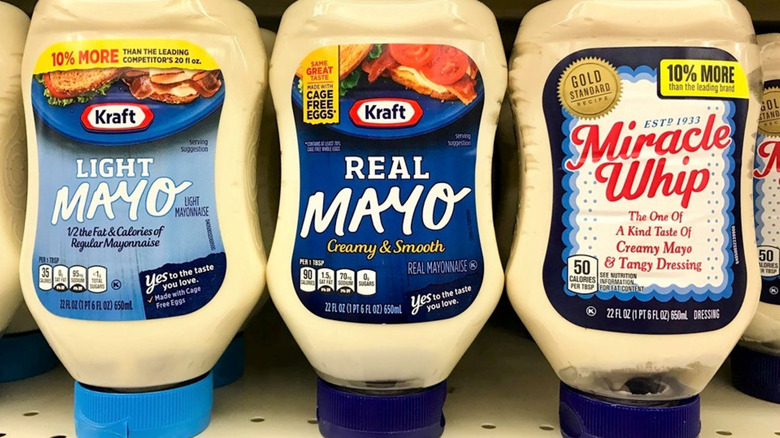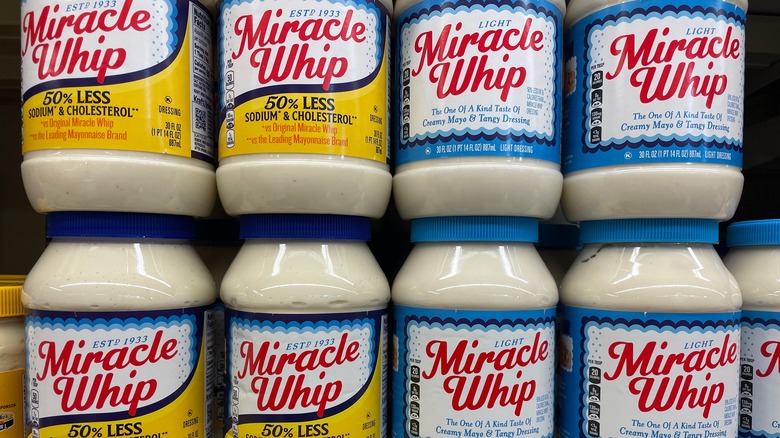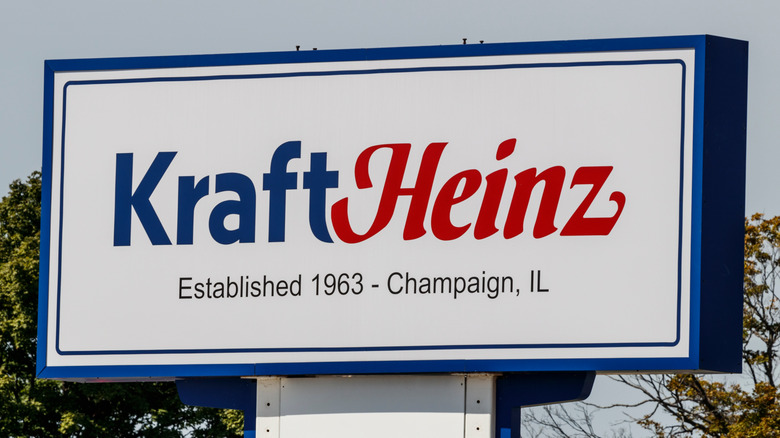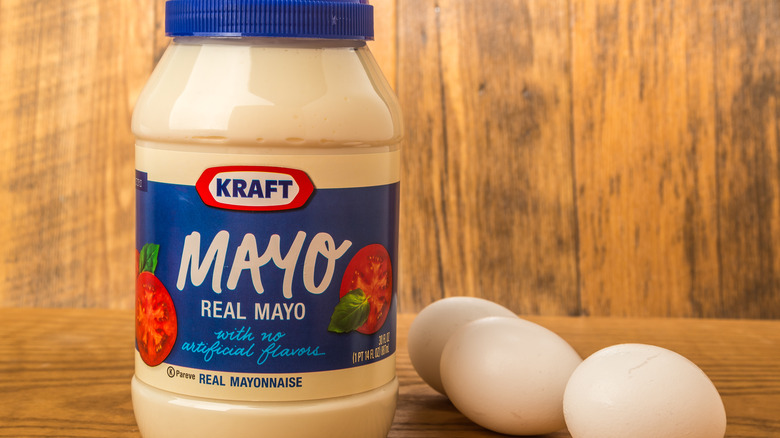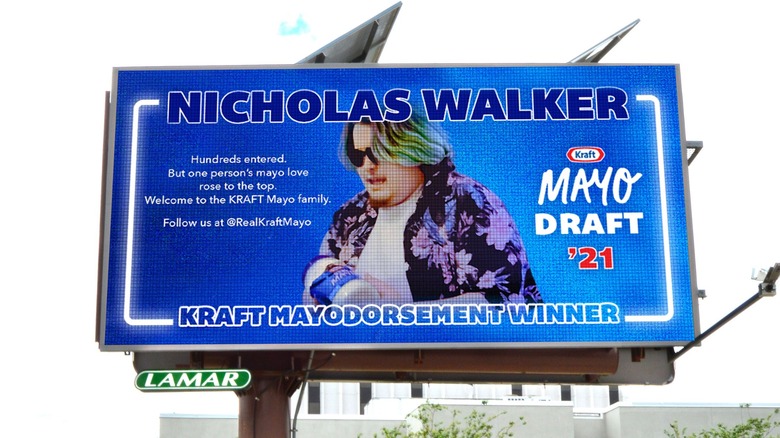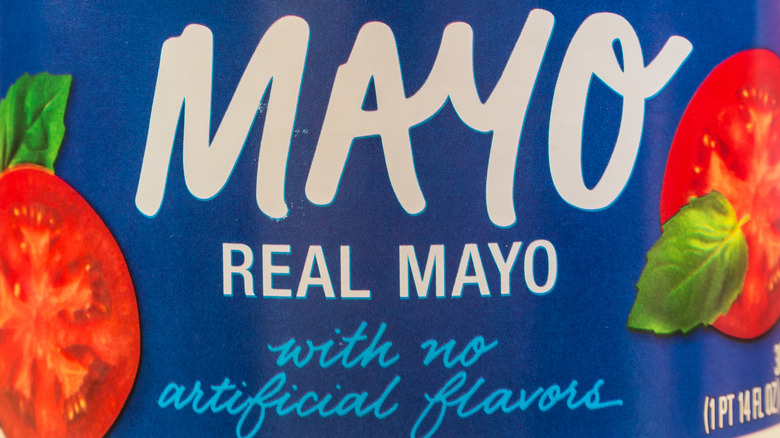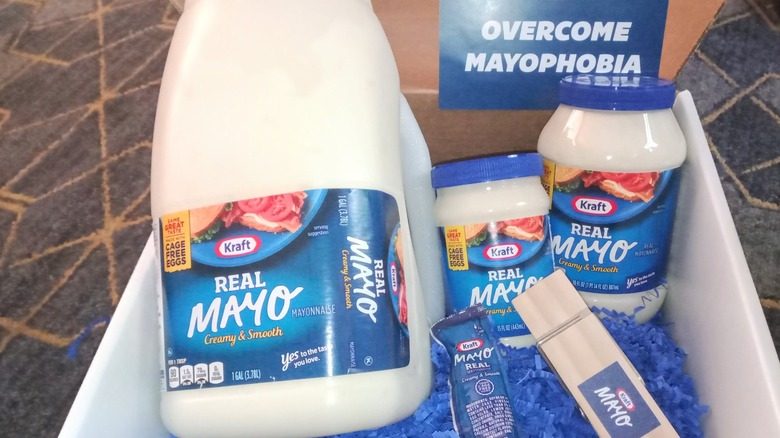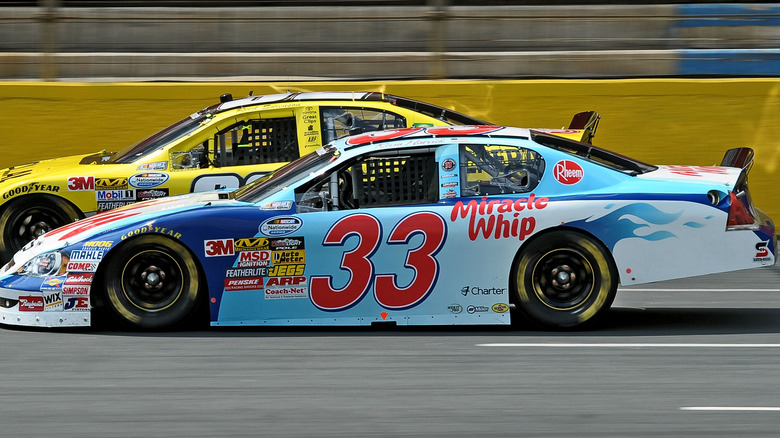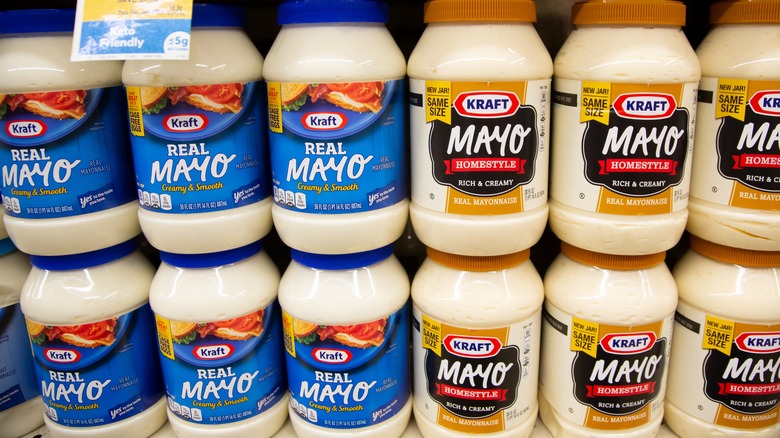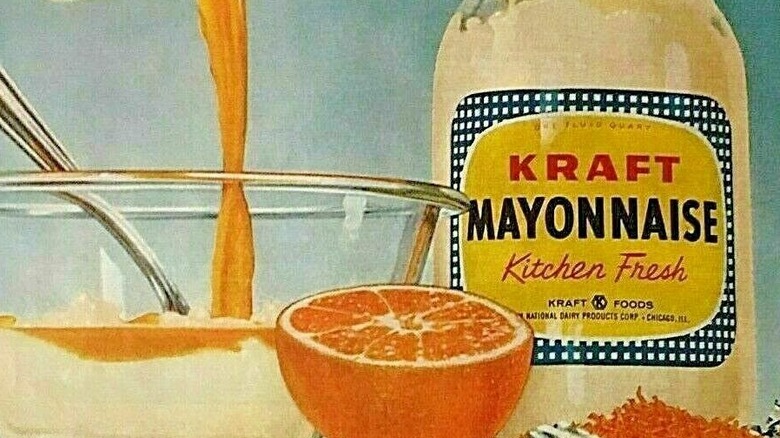What To Know Before Buying Kraft Mayonnaise
We may receive a commission on purchases made from links.
Step aside, ketchup — mayonnaise is the new mayor of condiment town. A towering titan of the culinary world, mayo has been the best-selling condiment in the U.S. for at least three years running as of 2021. The globby, fat-based spread is nearly unrivaled in its versatility, with recipes across the culinary spectrum calling for dollops of mayo.
But not all mayo is created equal. While some brands of the white-ish condiment have come and gone through the years, others, like Kraft Mayonnaise, have carved a long-lasting place within the mayo marketplace. The signature mayonnaise produced by the enormous food conglomerate Kraft Heinz has been a staple in refrigerators across the U.S. since the Great Depression.
While it can't quite touch the popularity of Hellman's — which more than doubled the sales of Kraft Mayonnaise in 2010 (via New York Post) — there's no doubt Kraft Mayo has earned its own sizable fanbase. If you're considering a switch to this grocery store mainstay and wondering what to know before buying Kraft Mayonnaise, we've got you covered. Here's a look at everything there is to know about the mayo brand and some fun facts to consider before making your purchase.
It's been around longer than sister brand Miracle Whip
Of all the mayonnaise or mayo-adjacent products sold by Kraft Heinz, Miracle Whip might be even more beloved than Kraft's regular mayonnaise. But while Miracle Whip almost surely has more passionate fans in its corner — as well as some detractors, given that it's not actually mayonnaise — it's not the oldest mayonnaise-type product sold by the company. That distinction belongs to the classic Kraft Mayonnaise, which was first sold in 1926 (via Grog to Grits) — several years before Miracle Whip's debut.
Interestingly enough, there isn't a lot of verifiable information out there regarding the origin of Kraft Mayonnaise. The history of Miracle Whip is front and center on the company's website. It first appeared at the 1933 World's Fair. But nothing surrounding the story of its classic brand of mayo is available. Perhaps people are less interested in the origins of the standard mayo than the tangy, zippy, slightly mysterious Miracle Whip.
Being the first mayonnaise (or mayonnaise-like spread) sold by Kraft may not boost the classic Kraft Mayo flavor above Miracle Whip in some eyes. But at least it can always claim seniority on the Kraft Heinz roster of condiments.
Kraft Heinz makes many different varieties of mayonnaise
As befitting a company that's as versatile as mayonnaise itself, the range of products made by Kraft Heinz is almost incomprehensible. It's only logical that the food giant, which produces varied items ranging from Velveeta to Capri Sun, would have mayonnaise offerings that extend well beyond its classic flavor. In fact, as of 2022, Kraft Heinz sold more than 25 mayonnaise products, according to its website.
While many of these are simply different-sized bottles of the same flavor, there's still a fair selection of mayonnaise varieties available to curious consumers. If you're interested in a low-fat version of Kraft Mayo, the company has you covered. Do you prefer a mayonnaise that includes olive oil or avocado oil in its ingredient list, or one with a garlic-infused taste? Kraft Heinz has what you need.
The company never seems satisfied with its offerings, though, and continuously seeks to improve what's available to customers. This included the introduction of Heinz Real Mayonnaise in 2018. That brand highlighted its use of cage-free eggs in its recipe (via Pittsburgh Post-Gazette).
It described itself as the 'mayo of mayonnaise' in ad campaigns
Depending on your general love of mayonnaise, you may or may not have a preferred brand. For those who feel that mayo is mayo and believe it shouldn't drastically alter the flavor of what you add it to, the difference between brands is likely negligible. But for some, including the purveyors of Kraft Mayonnaise, the type you use does, in fact, matter. Hence the decision by Kraft to advertise its product as the "mayo of mayonnaise" in a series of ads from April 2021 (via Ad Age). This was the first collaboration between advertising agency Wieden + Kennedy and Kraft Mayonnaise.
The commercials don't shy away from the not-so-secret fact that some folks simply don't like mayonnaise. Rather than attempt to woo the anti-mayo crowd, though, Kraft decided to go in the opposite direction: Appealing to certified mayo fans by highlighting its product's creaminess and including beauty shots of food slathered with what might be described as an uncomfortable amount of mayo.
It's impossible to tell, based on available data in 2022, whether the advertising strategy translated to increased sales. But as an attempt to increase the brand's visibility to consumers, it's easy to imagine the ad campaign did the trick.
Kraft held a contest in 2021 to win a 'mayodorsement'
Fan contests are a surefire marketing technique for promoting customer engagement. After all, what better way to incentivize gullible customers to purchase or endorse your product than dangling the carrot of some grand prize? It may be unfair to categorize participants in a certain 2021 Kraft Mayonnaise contest as gullible, though, considering the prize involved — giving a bonafide mayonnaise mega-fan an opportunity to win a "mayodorsement" from the company alongside a $10,000 signing bonus.
Beginning with an initial "mayodorsement" given to Clint Thrasher — a person dubbed "mayo man" after he was seen eating a tub of mayonnaise at a baseball game in 2019 (via Inside Edition) — the contest asked genuine mayo lovers to display their passion on social media. To win prizes including a billboard, print ad, and custom-made mayonnaise jar with the winner's face, according to Thrillist, fans were encouraged to concoct a unique post demonstrating why their mayonnaise fandom was superior to all others.
The hullabaloo regarding a potential "mayodorsement" for mayonnaise super fans prompted strong participation. In June 2021, Nebraska man Nicholas Walker was crowned the winner, earning his place in the Kraft Mayonnaise pantheon (via Lincoln Journal Star).
It discontinued its fat-free mayo in 2021
Kraft Mayonnaise has taken a uniquely humorous approach to its advertising philosophy in recent years. One move made us think that the company's executives might be big fans of the sitcom "Friends." When Kraft announced the decision to stop production of fat-free mayo with a humorous "mayo culpa" in 2021 (via Yahoo), it was hard not to think of Monica Gellar (Courtney Cox) derisively declaring low-fat mayonnaise "is not mayonnaise!"
Actually, it's entirely possible Kraft Mayonnaise's "mayo culpa" (what a pun!) wasn't inspired by the classic '90s series. After all, while the company stopped making fat-free mayo, it still sells low-fat mayonnaise varieties, and there were no winking references to the show contained in the social media post that informed the public it was no longer going to manufacture its fat-free product.
In a statement to Today, Kraft Mayonnaise plainly conceded that fat-free mayo wasn't a very tasty product. In other words, it's quite likely the decision to nix fat-free mayo was a result of dissatisfied customers rather than pop cultural influence. But it's fun to imagine otherwise, isn't it?
It helped consumers with alleged mayophobia in 2021
Few foods are as simultaneously beloved and controversial as mayonnaise, with its gelatinous, not quite solid or liquid consistency. The impossible-to-categorize nature of mayo creates a textural nightmare for some, and the sheer fact that it's basically spreadable fat can turn certain people's stomachs. For those who felt their dislike of mayonnaise had shifted into true fear, Kraft was willing to help in 2021 by offering Overcoming Mayophobia kits to (un)lucky consumers (via Marketing Dive).
While some may simply be disgusted by anything mayonnaise-related, others, at least according to Kraft, have a real phobia of the condiment. Not that it's any real surprise an irrational fear of mayonnaise exists, considering just about anything seems capable of springing inexplicable terror on someone in the world.
Naturally, the overarching goal of Kraft's Overcoming Mayophobia kits was to court new customers. As Danielle Coopersmith, brand manager for sandwich enhancers at Kraft Heinz, said at the time (via The Shelby Report), "there are two types of people in this world: people who love Kraft Mayo, and people who don't know they love Kraft Mayo." Clearly, then, distributing the kits wasn't just about making folks become comfortable with mayonnaise — it was about converting them into fans of Kraft Mayo specifically.
A unique flavor profile distinguishes it from other mayonnaise brands
For some consumers, mayonnaise is simply a creamy, weirdly lard-like product that's there to provide an unobtrusive moisture to your sandwich or recipe. For others, though — like Kim Wexler's exciting-as-white-bread boyfriend in the final season of "Better Call Saul" — only one specific type of mayonnaise will do. This could be why Kraft Mayonnaise attempts to distinguish itself with a unique flavor profile among popular mayo brands.
Perhaps inspired by the well-known "tangy zip"of its sister condiment spread, Miracle Whip, Kraft Mayonnaise doesn't taste the same as any other run-of-the-mill mayo variety. With notable hints of garlic and onion compared to other leading brands, Kraft Mayo is often the preferred brand used by recipe developers, according to a 2020 mayo taste test by the Los Angeles Times.
For some, the distinctive taste found in Kraft Mayo may be unappetizing. But if you're eager to incorporate a mayonnaise that brings more to the table than just emulsified oil and eggs, a jar of Kraft Mayonnaise may do the trick.
Fans could have their fortune told by a mayo reader in 2021
Superstitions can have a powerful effect on people, particularly when the inherently random nature of life is taken into account. With this in mind, it's no surprise that supposed spiritual mediums and fortune tellers continue to be popular sources of mystical entertainment. In 2021, Kraft Heinz did a promotion that took advantage of the enduring appeal of gaining insight into one's future. Rather than reading tea leaves, however, it tapped comedian David Ebert to become the world's first mayo reader – as in using mayonnaise to read people's fortunes.
Kraft's decision to offer mayo readings was conceived in conjunction with the planet Mercury going into retrograde in May 2021. As Kraft Real Mayo Brand manager, Frances Sabatier, said at the time (via PR Newswire), the brand was "about standing up for love of mayo and ... that's why we're diving headfirst into the controversial cultural debate around astrology."
From May 19 to May 26 of that year, fans could share pictures of Kraft Mayonnaise on the company's social media accounts and have their fortunes read (so to speak). Of course, it's highly unlikely anyone's future was accurately predicted by the patterns of their mayonnaise swipes on bread. But if the company's own mayo reading predicted the campaign would drum up more conversation around the brand, we'd have to say that came true.
Miracle Whip is more popular with consumers
We know Miracle Whip is not technically mayonnaise because its oil content falls below the threshold to be legally labeled as mayo. But it still seems fair to lump Miracle Whip and Kraft Mayonnaise together as a pair of similar products, given that they're used for the same applications. Of course, the difference in flavor between them means consumers are often partial to one over the other. And, as recently as 2016, more Americans preferred Miracle Whip to Kraft Mayonnaise across the nation.
This wasn't the first time it edged out Kraft Mayo with consumers, as Miracle Whip also had higher total sales in 2010, according to the New York Post. Perhaps the unique flavor differentiating Miracle Whip from regular mayonnaise has helped it earn a more loyal, hardcore fanbase. The fact it contains about half as many calories and fat as regular mayonnaise almost certainly increases the appeal for some consumers (via Healthline), too, though no one would ever call Miracle Whip a healthy food.
Kraft Mayo may be a slightly older product overall (via Grog to Grits), but that doesn't mean it's been as popular as Miracle Whip through the years. Maybe it's the distinctive tangy taste or its somewhat lighter nutritional profile compared to Kraft Mayo. Whatever the case, Miracle Whip seems to outrank its Kraft Mayonnaise counterpart in popularity.
Production increased in March 2020 to meet shifting consumer demand during pandemic
There's no denying the state of the COVID-19 pandemic has changed drastically since it first began in March 2020, particularly compared to the first few months. The previously unimaginable need for social distancing and personal isolation at that time meant more of us were eating — and therefore cooking — at home than ever before. Consequently, consumers stocked up on food supplies designed to last them an indefinite amount of time, leading many companies, like Kraft Heinz, to increase production to meet demand (via Chicago Tribune).
It wasn't just Kraft Mayonnaise that saw a boost in manufacturing in April 2020, though, as production of Miracle Whip, macaroni and cheese, and other Kraft Heinz items also increased at its Champaign, Illinois plant. This makes sense, of course, as did shoppers' impulse to stock up on shelf-stable foods during that time. There was no real end in sight to stay-at-home orders during the early portion of the pandemic, after all, so preparing for the long haul was seen by many as the only option.
The specific sales numbers for Kraft Mayo during that initial, uncertain time period aren't readily available. But considering that the uptick in production coincided with an eventual 70% increase in household penetration of Kraft Heinz products in the U.S. by September 2020, according to CNBC, it seems likely Kraft Mayonnaise helped boost the company's bottom line that year.
The voice of Patti Mayonnaise from 'Doug' appeared in several commercials
With the possible exception of Alex Mack, no Nickelodeon character was the object of more 1990s crushes than Patti Mayonnaise. Sure, she was animated. But if you grew up habitually watching "Doug," there's a better than average chance that you, like the show's mild-mannered protagonist, harbored a modest crush on Patti. Of course, even the world's biggest "Doug" fan may not know Patti's last name has an interesting connection to the career of the actor who voiced the character. A series of Kraft Mayonnaise commercials from the '80s and '90s featured the character's voice actor, Constance Shulman.
Although you might think that the Kraft connection was the reason Patti's last name was Mayonnaise, according to Shulman herself, the fact she appeared in several Kraft Mayo commercials just before her iconic role as Patti Mayonnaise was little more than an amusing coincidence (via Vanity Fair). Either way, the serendipitous nature of a former mayonnaise spokeswoman voicing a character with the surname Mayonnaise is a delightful discovery.
Whether or not Shulman's prior professional credits prompted the classic cartoon's creators to name the character Patti doesn't matter, of course. The legacy of "Doug" is undeniable, just like the reputation of Kraft Mayonnaise.
Early advertisements described it as kitchen fresh mayonnaise
Is there any advertising strategy more disingenuous than the notion that a mass-produced product is freshly-made? After all, the simple fact a product is packaged, shipped, and then sold negates any claim that it could be freshly prepared. That didn't stop Kraft Mayonnaise from describing itself as "kitchen fresh" during its first few decades in existence, however.
Now, it may not have been entirely accurate for Kraft to state its product was as genuinely fresh as mayonnaise prepared at home. Yet as one 1933 print ad shows, the tagline may not have been meant literally, but rather as a way to distinguish itself as fresher-tasting than other mayo brands.
The exact timeline of Kraft's shift away from its kitchen fresh promise isn't entirely clear. But with at least one vintage Kraft Mayo ad showing the tagline was still being used in 1958, it seems as though the company rode that advertising train as far as it could.
